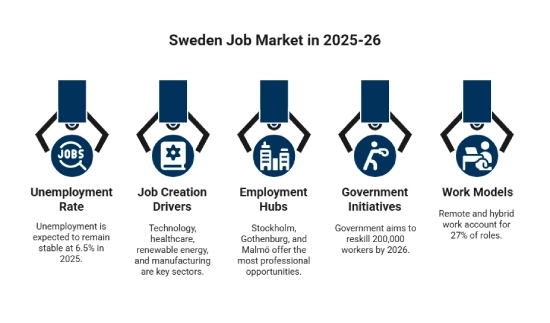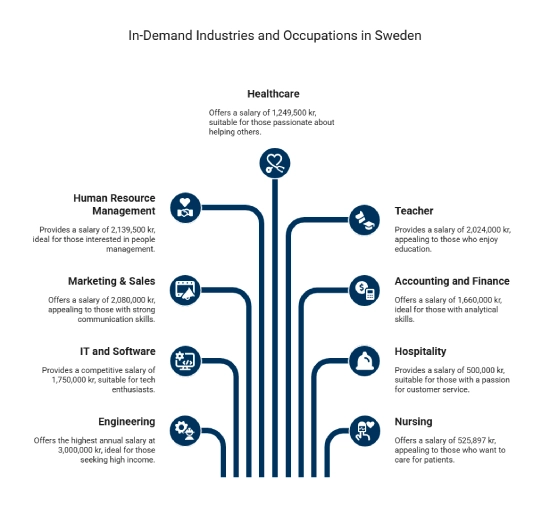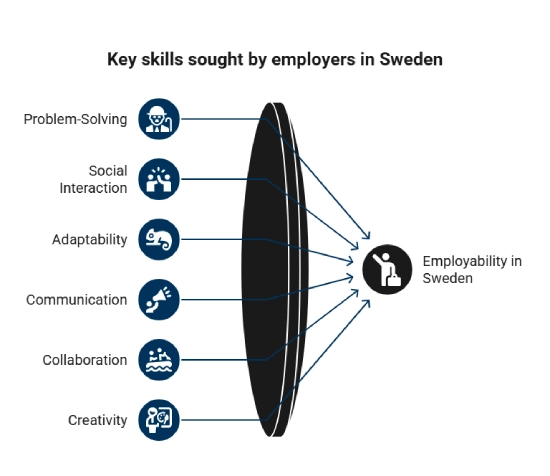Sweden Job Market and High-Demand Jobs
In 2025-30, Sweden's job market is set to be driven by innovation, sustainability, and a rising need for skilled workers. Thanks to its stable economy and progressive policies, Sweden keeps drawing in talent from both home and abroad in sectors that are growing fast.
- Unemployment forecast to remain stable at 6.5% in 2025
- Technology, healthcare, renewable energy, and manufacturing drive job creation
- Stockholm, Gothenburg, and Malmö lead in employment opportunities for professionals
- Government initiatives aim to reskill over 200,000 workers by 2026
- Remote and hybrid work models account for 27% of roles across industries

Job Outlook in Sweden 2025-30
Understanding the Job Outlook for Job Seekers and Employers
Sweden's job market looks to be in good shape for 2025-26, thanks to consistent economic growth and helpful government actions. The jobless rate should stay steady at about 6.5%, like it was before the pandemic, and there are more open positions in important areas.
Companies are searching for qualified people to take positions in both new and old industries. Tech, healthcare, and green energy are in the lead, with STEM jobs growing by about 8% each year. Healthcare is expected to create over 50,000 jobs by 2026, mostly because the population is getting older.
This means there are lots of different chances for people looking for work, especially in fields that are using new tech and focusing on being sustainable. Since there's a big need for digital and eco-friendly know-how, those who improve their abilities will have a big edge in Sweden's changing job scene.
General Employment Trends for the Year
Sweden's job market shows a dedication to both new ideas and good living. The need for tech-savvy people in IT and engineering keeps growing because of the push for more tech and digital options. Options for flexible work, like hybrid and remote setups, are now normal in many fields since workers value a good balance between their jobs and personal lives. Also, there's a bigger push for sustainability, so green jobs in areas like renewable energy are becoming more important. Those looking for jobs can do well if they keep up with these changes and learn the skills that are wanted.
Factors Influencing Job Creation or Reduction
In Sweden, several things affect job creation and loss, including the economy, new tech, and societal shifts. The country's focus on innovation has produced many openings in tech fields. Government actions and pro-worker rules help jobs grow, mostly in new businesses and green energy.
But, machines and digital changes are changing old jobs, which mean some routine jobs are disappearing. The global economy, trade deals, and Sweden's active business world also greatly shape the job market. These changes show that it's key for both employers and job hunters to learn new skills and accept new technologies.
*Willing to Work in Sweden? Y-Axis will guide you in all the steps.
In-Demand Industries and Occupations in Sweden
The demand for skilled professionals spans several high-growth sectors, with notable job opportunities in:
|
Occupations |
Salary (annually) |
|
Engineering |
3,000,000 kr |
|
IT and Software |
1 750 000 kr |
|
Marketing & Sales |
2,080,000 kr |
|
Human Resource Management |
2,139,500 kr |
|
Healthcare |
1,249,500 kr |
|
Teacher |
2 024 000 kr |
|
Accounting and Finance |
1,660,000 kr |
|
Hospitality |
500,000 kr |
|
Nursing |
525,897 kr |

Workforce demands in the Sweden
Examination of Job Market in Sweden
Sweden has a job market with a lot of movement and variety. There's a high need for workers and chances to grow in many job types. A lot of Swedish cities have become important centers for new ideas, money management, and eco-friendly progress. Stockholm is known worldwide as a tech center with many new companies starting up, and Gothenburg does well in cars and shipping. Malmö and Uppsala are also known for a lot of jobs and for helping with health and schools. Because of these strong parts of the economy, there is a stable need for trained people in different fields.
Highlighting Areas with Notable Job Opportunities
Many cities in Sweden, such as Stockholm, Gothenburg, Malmö, Uppsala, Linköping, Helsingborg, Västerås and Örebro, have lots of jobs with good pay. The IT, engineering, healthcare, nursing, finance, management, HR, marketing and sales, accounting, and hospitality areas are especially busy. Sweden wants to keep being innovative, green, and able to compete with other countries, so people with skills in these jobs are in demand.
Impact of Technology and Automation in Sweden
Technological Advancements and Automation Shaping the Job Market
Sweden's job market is changing fast because of tech and automation. These shifts are reshaping industries, making operations simpler, and opening up new job options for those with skills. Because we depend more and more on digital tech, there's a greater need for experts in IT, software, and other tech areas. Sweden knows automation impacts jobs, so they've set up plans to support people in gaining new skills. These ongoing learning programs help pros keep up with what they need to stay competitive in the changing job market.
Potential Opportunities and Challenges for Workers in the Evolving Landscape
Sweden's job market is changing, and there are way more openings now in fields like IT, software, STEM, healthcare, nursing, hospitality, teaching, management, HR, marketing, sales, and finance. Remote and hybrid work is also getting bigger, which means workers get more flexibility, and companies can hire from a bigger pool of people. To do well in this fast-moving world, though, people need to focus on learning new skills to keep up with what industries want and the newest tech.
Skills in-demand in Sweden
Employers in Sweden seek to hire candidates with certain skills and they are:
Key skills sought by employers in Sweden
- Problem-Solving
- Social interaction
- Adaptability
- Flexibility
- Communication
- Collaboration
- Creativity
- Leadership
- Teamwork
- Time Management
- Critical Thinking
- Emotional Intelligence
- Customer Service
- Language proficiency in English and Swedish
- Cultural Competence

Importance of Upskilling or Reskilling for Job Seekers
Learning new skills or retraining has become super important if you want to grow in your job. It helps you stay fresh, flexible, and able to bounce back in your career. Since Sweden is changing fast with tech and more stuff is becoming automated, workers need to keep up so they can meet the needs of different businesses. Upskilling helps people get better at what they already do by just learning as they go. Reskilling gives people the skills they need to switch to totally different jobs when things change. Focusing on always learning isn't just good for workers; it also helps companies be more creative and flexible, which sets them up to do well in the long run.
Remote Work and Flexible Arrangements
Exploration of the Continuing Trend of Remote Work
Remote and hybrid work have really taken off in Sweden's job market. The pandemic got things started, but now you see these setups all over, especially in IT, consulting, finance, and creative fields. Companies are using flexible work to get and keep good people, and workers like it because it makes balancing work and life easier and cuts down on travel time. Because of this change, companies can also hire from a bigger group of people, including those in other places or even other countries, which makes Sweden's workforce even more diverse.
Implications for Both Employers and Employees
For employers, flexible arrangements have been linked to increased productivity, higher employee satisfaction, and improved retention rates. They also enable companies to adapt quickly to changing market conditions. Employees, in turn, benefit from greater autonomy, enhanced well-being, and the ability to tailor their schedules to personal and professional needs. Swedish labour regulations support this trend by ensuring clear guidelines on pay, working hours, and leave entitlements from the first day of employment, creating a transparent and fair framework for both parties.
Government Policies and Initiatives in Sweden
Overview of Government Programs or Policies Influencing Employment
Sweden's become a top spot for skilled people wanting jobs overseas. The Swedish government's really trying to get and keep foreign pros in all sorts of fields. Swedish bosses are trying to hire folks from other countries to fill empty jobs, especially in healthcare, IT, engineering, and green energy. To make it easier, the government's got programs that help migrants get settled and working smoothly.
In the first three months of 2023, Sweden handed out over 10,000 work permits. Right now, there are over 406,000 open positions around the country, and that number should go up as the need for skilled workers keeps growing.
Analysis of How Policy Changes May Impact the Job Market
Government policies are super important for how the job market works in Sweden. Things like tax breaks for companies, spending on schools and job training, and things like social security all help the economy grow and create jobs. Changing immigration rules and helping foreign workers learn new skills makes sure that industries that really need workers can find them. Doing these things is key to keeping Sweden competitive and innovative.
Challenges and Opportunities for Job Seekers in Sweden
Job seekers in Sweden may encounter certain challenges when navigating the employment market, particularly in highly competitive sectors or roles requiring Swedish language proficiency. However, these challenges also come with opportunities for those prepared to adapt and upskill. Below, we outline some of the common obstacles job seekers face, along with practical tips and strategies to successfully navigate Sweden’s dynamic job market:
Challenges and Opportunities for Job Seekers in Sweden
Job seekers often face a variety of challenges when searching for employment in Sweden. These obstacles can range from outdated resumes to language and cultural barriers. Below, we outline the key challenges and offer practical strategies to help job seekers successfully navigate Sweden’s competitive job market.
Challenges Faced by Job Seekers
- Keeping Resumes Updated: Many candidates struggle to keep their resumes current and tailored to job requirements.
- Uncertainty About the Application Process: Lack of clarity about how to apply or what employers are looking for can cause confusion.
- Limited Access to Job Information: Job seekers often lack proper insights into job openings or company cultures.
- Differences in Skills: Skills mismatches between what is offered and what employers need.
- Language and Cultural Barriers: Non-Swedish speakers may find it challenging to secure jobs, particularly in non-international companies.
- Lack of Confidence: Job seekers may feel uncertain about their qualifications or ability to succeed in interviews.
- Networking Challenges: Difficulty in connecting with professionals or potential employers, especially without local contacts.
Tips and Strategies for Navigating the Job Market Successfully
- Tailor Your Resume and Cover Letter: Ensure that your resume and cover letter are always up-to-date and customised for each application.
- Invest in Continuous Learning: Stay informed about industry trends and invest in new skills to remain competitive.
- Improve Language Proficiency: Enhance your Swedish and English language skills, especially for roles requiring strong communication.
- Upskill and Obtain Certifications: Take courses or certifications that align with in-demand skills in Sweden’s job market.
- Network Actively: Attend professional networking events and engage on online platforms such as LinkedIn to expand your connections.
- Establish a Strong Online Presence: Make sure your LinkedIn profile is professional, up-to-date, and reflects your skills and experience.
- Prepare Thoroughly for Interviews: Practice common interview questions and be ready to articulate your skills, experience, and passion for the role.
.webp)
Summary of Sweden Job Outlook
Sweden offers a promising job outlook, underpinned by a strong focus on innovation, sustainability, and work-life balance. There are abundant opportunities for skilled professionals across multiple sectors, particularly in technology, healthcare, and renewable energy. Government initiatives aimed at supporting employment, entrepreneurship, and business development have created a favourable environment for job seekers and businesses alike. To succeed in Sweden’s competitive job market, individuals should focus on strategies such as upskilling, expanding their professional networks, and adapting to local industry practices. This approach will enable professionals to not only navigate but thrive in Sweden’s dynamic employment landscape.
Looking for Inspiration
Explore what Global Citizens have to say about Y-Axis in shaping their future
Frequently Asked Questions
